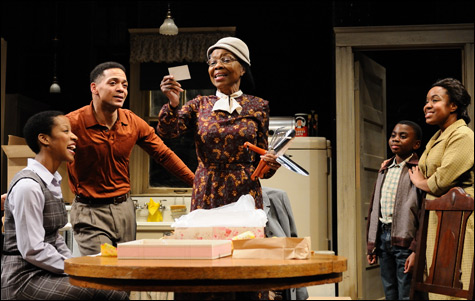
A RAISIN IN THE SUN: Trinity sheds new light — both warm and fiery — on the old work. |
The centerpiece of George C. Wolfe's 1986 satire The Colored Museum is a scathing sketch called The Last Mama-on-the-Couch Play. A Raisin in the Sun is the über-mama-on-the-couch play — though in the powerful revival currently at Trinity Repertory Company (through March 8), I don't recall Barbara Meek's Lena Younger once resting her weary bones on the old rose-colored couch. Freestanding brick-tenement façades punctuate Michael McGarty's gauzy maze of a set, but I don't recall many walls, either — and that includes the fourth, usually a major edifice of realism. Instead, Brian McEleney's staging of Lorraine Hansberry's landmark 1959 African-American family drama floats on the stage like a Tennessee Williams play and addresses itself to the audience like a political placard held aloft by Bertolt Brecht. And the audacious miscegenation of techniques seems to place the old couch, with or without mama on it, in that broader universe that Thornton Wilder, in an earlier American classic that abolished furniture altogether, located in "the Mind of God."
Considered a groundbreaker, A Raisin in the Sun was the first play by an African-American woman to open on Broadway, where, helmed by a black director (Lloyd Richards), it ran for more than a year, copping the 1959 New York Drama Critics Circle Award for Best American Play. It has been done to death since then, most recently on Broadway in 2004 with a cast led by Sean "Diddy" Combs. But Trinity sheds new light — both warm and fiery — on the old work. Raisin draws its title from a Langston Hughes poem that here finds its way, on more than one occasion, into the play, the actors facing us directly to trade off declaiming Hughes's inquiry into what happens to a dream deferred: "Does it dry up/Like a raisin in the sun? . . . Or does it explode?" At Trinity, the dream is ultimately grasped with a feisty melancholy. It's the character of Walter Lee Younger, in the riveting if too volatile person of Joe Wilson Jr., who's allowed to explode.

Lighting the fuse are occurrences within the Younger family as they await, in their Chicago Southside apartment, the arrival of a $10,000 check — the life-insurance legacy of Lena's husband and Walter Lee's father, "Big Walter," a laborer who worked himself to death in the service of his family. (The remaining members are college student Beneatha, who aspires to be a doctor when she isn't flirting with African culture, and Walter Lee's wife, Ruth, and their 10-year-old son, Travis, whose bedroom is the couch.) Walter Lee sees investment in a liquor store as the clan's key to the American dream. Lena, appalled by her family's splintering into frustration and dissent, instead buys a house in what is revealed to be a snivelingly unwelcoming white neighborhood.
Raisin ripened before August Wilson brought the power of the blues and the poetry of black speech to African-American drama. But the Youngers are flesh-and-blood individuals in a flesh-and-blood family, here brought to life by a cast skilled enough to scale McEleney's heightened reality without taking their feet from the familiar, hallowed ground of Hansberry's realism. Impassioned speeches directed toward the audience, instead of across a table festooned with scrambled eggs and coffee, might be disconcerting. But the Trinity actors lob their rhetoric through the fourth wall without leaving the cramped intimacy of parlor and kitchen, where their aspirations, beliefs, affectations, resentments, and dreams butt up against one another's. And McEleney underlines the chafing closeness by eliminating most of the walls within the apartment building, so that we see the off-stage Youngers trudging through the neighborhood, lying on their beds, eavesdropping, or jockeying for the bathroom they share with another family. This makes for a richly textured production in which the performances jump like firecrackers in a well-worn hammock.
The venerable Barbara Meek is a stalwart Lena — frail but square-shouldered, with a sly delivery that brings out the droll humor in Hansberry's seasoned matriarch. And there are spirited turns by Brown/Trinity Rep Consortium students: Lynnette R. Freeman as the worried Ruth; Angela K. Thomas as the headstrong, anti-assimilationist Beneatha; and Charlie Hudson III and Jude Sandy as Beneatha's suitors, preppy African-American collegian George Murchison and confident Nigerian and wanna-be revolutionary Joseph Asagai. Freeman, in particular, finds a touching contrast between Ruth's skeptical, tight-lipped tough love and the hallelujah-ridden exultation with which she says goodbye to the old neighborhood.
The fly in the ointment is the galvanic, physically gifted Joe Wilson Jr., whose portrayal of Walter Lee calls too much attention to itself to attain the brilliance it brushes. For much of the play, Wilson's tightly coiled Walter Lee alternates piquantly between door slamming and depression, between rage and contempt for the dream deferred — not just by a racist society but also, in his view, by the loved ones holding him back. At a certain point, however, it's as if this impressive actor had begun to demonstrate a man whose fury and viscera have taken him over. Never satisfied with being a chauffeur, Walter Lee dreams of becoming the entrepreneur in the plush back seat — but Wilson has become the revved-up car itself.